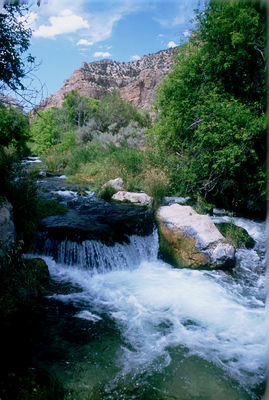It’s more than an hour before dawn. To the east, Venus shines more brightly than I’ve ever seen it, morning or evening. It’s so bright that I’m not sure at first what it is.
 Late in the afternoon in the canyon beyond town, and there isn’t a soul in sight or a man-made sound within earshot. The roar of the swollen stream dominates the aural environment, though the creek is tens of meters below.
Late in the afternoon in the canyon beyond town, and there isn’t a soul in sight or a man-made sound within earshot. The roar of the swollen stream dominates the aural environment, though the creek is tens of meters below.
Solitude in such a place is a tremendous gift, although it is a gift that one has to give oneself; no one is going to give it to you. That isn’t selfish, and it has nothing to do with the care and feeding of the self. In complete solitude and stillness, one is all of humanity.
Even writers for that beacon of enlightenment, the New York Times, now say, with unintended understatement, “constant activity isn’t an enjoyable or productive way to live.”
Their remedy? Take a “Shultz hour,” as in George Shultz, Ronald Reagan’s Secretary of State. He had his secretary hold his calls for one hour a week, so he could have some solitude and “carve out one hour each week for quiet reflection.”
One hour a week! If you’re over 18, not taking a half-hour a day to be alone, process things, and observe oneself to the end of the observer, the chances you’re a zombie in this dead culture are over 95%.
Perhaps the dead can come back to life, but this is written for the living, and those who really want to come back to life.
Everything seems predicated on choice—consumer choice and personal choice, which are really the same thing. Market indoctrination permeates the culture and our lives, leaving us feeling utterly empty, controlled, and little more than cattle herded on and off packed airplanes going nowhere.
There are choices obviously, small and large, which determine the course of our lives. But the entity that chooses is always conditioned by experience, culture, upbringing, and other pre-existing factors. In other words, the past.
To observe without choice or evaluation is to observe without the prejudice of the past. Doing so awakens intelligence.
Contrary to Western philosophical dogma, the human being has the capacity to perceive directly, and live according to insight rather than interpretation and conditioning.
With the collapse of the American dream (even as its pathological version infects the world as a whole), and the end of the old order without the emergence of a new one, the awakening of intelligence is essential to inward survival and growth.
What is freedom? We think we are free because we can choose, but we are actually slaves to choosing. Choices exist obviously; but the choosing self is the greatest illusion.
There is no freedom of choice, only freedom in not choosing, and simply seeing/acting, as paradoxical and counterintuitive as that sounds.
In choosing, there is always division and duality between the choices and the chooser. Perception and action are seen as separate, and action is broken up. But there is another way altogether, in which perception and action are part of a unitary movement. That’s intelligence, and we can move in that direction.
The observer, self, and ego are all essentially the same thing, the same basic movement of separation and choice. This movement is as old as man, but it has come to dominate more and more in recent decades, as rapacious capitalism and runaway individualism have increased and merged, to the point that the human capacity for insight and empathy are now threatened.
If one does not choose, but simply attends; if one does not judge, but simply allows, then the mind and heart are free to unfold and fall silent. From stillness comes insight, and one sees what to do, or not do.
Living that way doesn’t make things any easier, but it does greatly lessen the confusion and conflict of the choosing self. Human beings in the future will see the motto of our day, “I choose” for the grotesquerie it is.
Martin LeFevre

